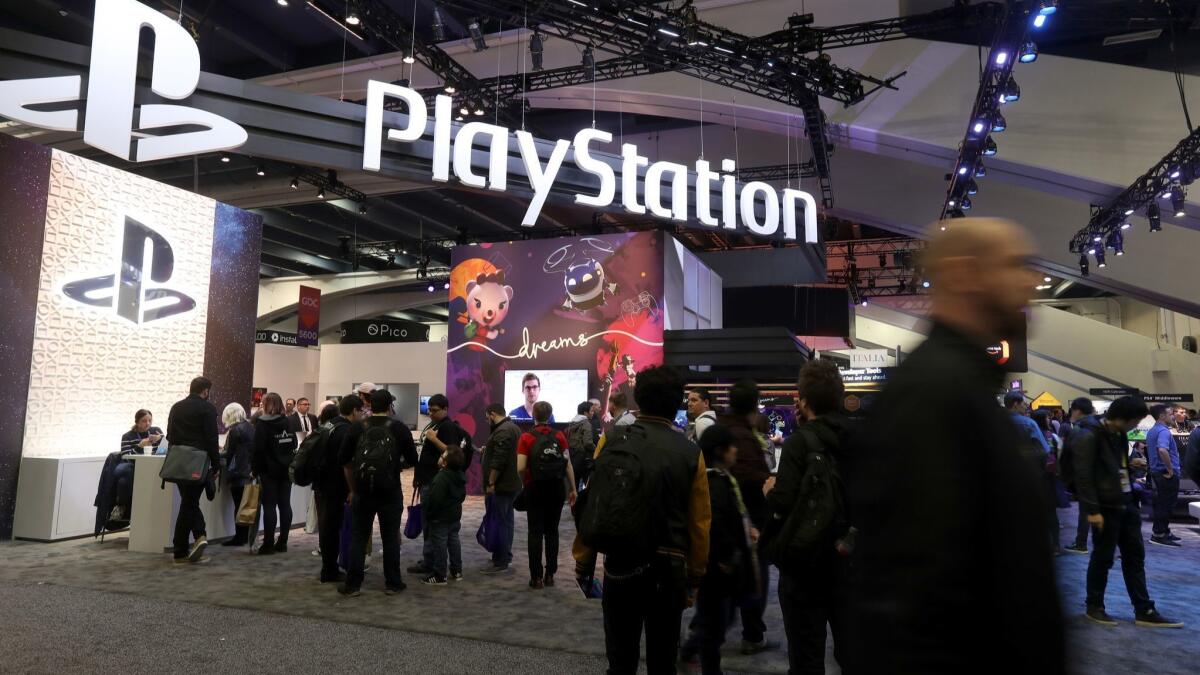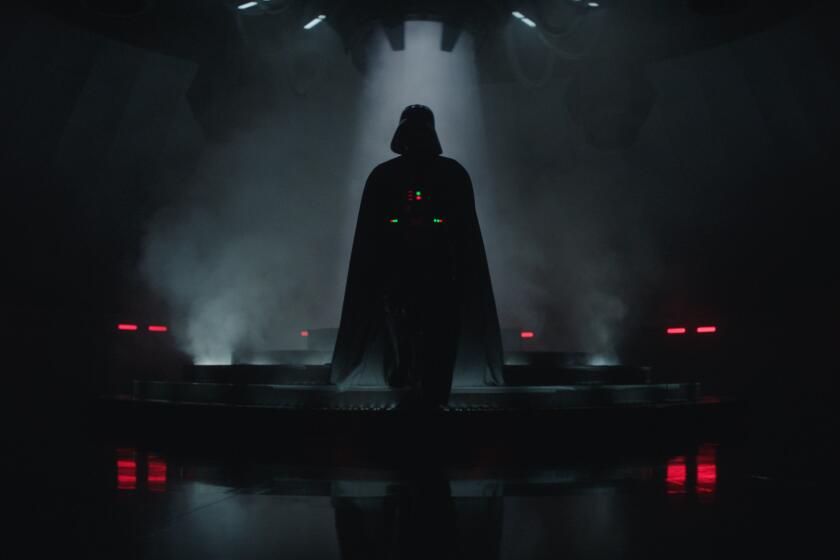Despite coronavirus, GDC held a virtual conference, and had lessons on getting into games

- Share via
With so many of us being asked to work from home — and remain at home during nonwork hours — video games have become a source of entertainment and a way to connect. But it’s worth remembering that the way games play to a developer, to an avid player and to a newcomer are often extremely different.
This was one lesson from the Game Developers Conference, which was expected to draw close to 30,000 people before the pandemic hit hard and the event was instead held online only.
In conversations and game showcases that would have been presented in San Francisco this week, an underlying themed emerged: Games must be better at speaking to the unconverted.
It was somewhat of an accidental theme.
Canceled on Feb. 28, just two weeks before it was supposed to begin, the Game Developers Conference was one of the first major events to be aborted due to coronavirus concerns after a number of top gaming companies, including Microsoft, Sony Interactive Entertainment and Electronic Arts, had already pulled their participation. Soon, a number of major conferences and events, including South by Southwest in Austin, Texas, and Southern California’s Coachella Valley Music and Arts Festival, would follow the GDC’s lead and cancel or postpone.
GDC organizers intend to return with a mini-event in August, while acknowledging that such a plan may be optimistic given the rapidly changing news. But they also quickly made the decision to ask speakers to record their talks to show during a weeklong free conference that would stream on Twitch.
Many of the talks emphasized various forms of accessibility, and even the titles honored during the annual awards show focused on more approachable works such as the wacky “Untitled Goose Game,” in turn creating a virtual festival that somewhat accidentally reflected a time when a potentially new audience would be looking to games for entertainment.
Tapping into our current mood wasn’t necessarily intended, says Katie Stern, the conference’s general manager. There certainly wasn’t time to do so. Calls were made to the previously scheduled speakers to submit a recorded talk; the GDC has collected enough videos that it intends to unleash another batch in coming weeks.
That so many talks were submitted was somewhat of a relief, and a statement to organizers that the event, despite being a great expense for many to attend, was a worthy endeavor (Wings Interactive has set up a relief fund to help those unable to recoup their GDC costs and has thus far raised more than $148,000).
Stern notes that the GDC was “not able to walk away scot-free” but declines to address the financial health of the group, adding that, despite the cancellation, GDC 2021 will go ahead as planned. The flood of recorded talks was something of a vote of confidence in the GDC, especially when the 20-person team was met with criticism that it didn’t cancel the conference quickly enough.
“We didn’t exactly have a playbook to follow,” Stern says, noting that the GDC was among the first major North American events to cancel and was dealing with sometimes conflicting information. “We tried really hard to balance what we were being told by our governmental agencies about it being safe to produce the event with what people personally feel, because perception is reality. We were trying to find the best common ground.
“We did initially catch some flak for doing so a whole 2½ weeks early,” she acknowledges, “which now seems silly when you see some of the other conferences that were canceling a day before or as people were moving in. I’m pleased that we were able to get out in front of it as quickly as we could and as quickly as it made sense to do so, given the knowledge that we had and how quickly it was spreading and ramping up. If our event was in May, it would be a completely different set of information that we had available.”
From my view as a journalist, watching the GDC unfold on my couch rather than running around San Francisco’s Moscone Center has been a welcome break from the news. Stern says the GDC is attempting to learn some lessons from the streamed talks, noting that, although the event lacks face-to-face communication, having developers present in the chat rooms during the talk potentially gives more people the ability to ask a question.
“Thinking about ways to capture that element for a future GDC is certainly something we’re talking about,” she says.
Many of the talks have also reminded me of the somewhat larger barrier to entry that many games possess, especially as friends and coworkers are asking for advice on how to “get into” games. Well, it’s not always easy.
Take, for instance, motion sickness.
Bobbing cameras, combined with a first-person point of view, along with asking the player to control both movement and how we see the action, is a learned language — one that can trip up even veteran players. And as Gearbox developer Andrew Bair laid out in an online talk, it’s one a development team, needing to maintain a schedule, can sometimes push against.
While ultimately Gearbox’s “Borderlands 3” compensated as well as it could for motion sickness, Blair says it bungled how it first handled captions, believing players wanted only vital text, when they actually needed more text than developers thought necessary. This helps not just the deaf, but even, say, new parents, who must play with the volume down and their attention partly diverted elsewhere.
Even seemingly simple games such as the thoughtful “A Short Hike,” a game largely intent on allowing players to explore at their own pace, can cause confusion. Adam Robinson-Yu wanted players to turn it on and wander, only they immediately went for a swim and found themselves on largely undesigned-areas of the game world, turning what was once an approachable game into an insurmountable one. Players were lost. His solution? Build an eye-catching cave that dumped players back at the beginning.
Especially revealing was Seth Coster’s talk on “Levelhead” and how the team at Butterscotch Shenanigans had to bake so-called forgiveness mechanics into the game — that is, when a game is behaving the way it’s designed, but not the way the player believes it should. For instance, what should be done when a jump of a certain distance requires perfect timing on the part of the player? Should the game compensate for imperfect hand-eye coordination or risk alienating a portion of its audience? Butterscotch opted for the former.
All told, it’s been a reminder that games are a storytelling-driven medium rather than simply a technical one, a fact underscored when “King’s Quest” creator Roberta Williams, arguably the most important force in advancing games as a narrative medium, received the GDC’s pioneer award at the prerecorded award ceremony. And sure, there’s been some purely technical talks too, such as Sony’s PlayStation 5 reveal that focused, almost clinically, on the power of an SSD hard drive. Such a lecture may have resonated inside the Moscone Center but disappointed an online audience eager to learn about new games.
Still, if the world cooperates and the GDC is able to gather for an August event, it will be because games, and play, allow us to feel more human. Even “Tetris” connects, developer Gwen Frey noted, because it is an emotional story, present in the stress, the tension and the joy of success we feel at solving a puzzle. And I’m eager to see what we’ve learned after potentially weeks of social distancing, and what revelations come when those forced to stay home try to rediscover the game medium.
Planning for August and even 2021’s GDC is in the early stages, but Stern imagines current events will play a role.
“I can’t imagine that it wouldn’t be addressed,” she says. “We have a pretty strong record of discussing and having conversations and talks around topics in the industry that would otherwise be considered taboo. Things like health and wellness within studios and handling harassment in the community and things around unionization. Other conferences may potentially shy away from that, but we lean into it.”
More to Read
The biggest entertainment stories
Get our big stories about Hollywood, film, television, music, arts, culture and more right in your inbox as soon as they publish.
You may occasionally receive promotional content from the Los Angeles Times.











